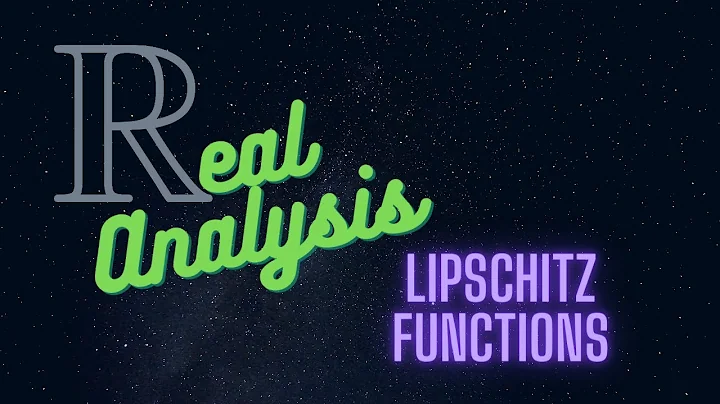If a Function is Lipschitz Then It is Uniformly Continuous
Uniform limit of Lipschitz functions is a Lipschitz function
Solution 1
This is clearly false. For example, you know the theorem of Weierstrass that if $f$ is continuous on $[a,b]$ then there exists a sequence of polynomials $P_n$ so that $P_n\to f$ uniformly on $[a.b]$, right? Those polynomials are Lipschitz on $[a,b]$.
Edit: As mentioned in comments, it is true if the $M_n$ are bounded. In that case there exists $M$ so that $$|f_n(x)-f_n(y)|\le M|x-y|$$for all $x,y$ and $n$. So $$|f(x)-f(y)|=\lim_{n\to\infty}|f_n(x)-f_n(y)|\le M|x-y|.$$(So if the $M_n$ are bounded you don't even need to assume uniform convergence, just pointwise convergence. The point is that if the $M_n$ are bounded then the $f_n$ are equicontinuous; see the Arzela-Ascoli theorem.)
Solution 2
Elementary example: Let $f_n(x) = \sqrt {x+1/n}$ for $x\in [0,1].$ Then each $f_n$ is continuously differentiable on $[0,1],$ hence is Lipschitz there. But $f_n(x)\to f(x)=\sqrt x$ uniformly on $[0,1],$ and $f$ is not Lipschitz there.
Solution 3
Thiis is not true. Look at $$f_n(x)=\sum_{k=1}^n{\sin(2^kx)\over k^2}.$$ These converge uniformly to a continous function. They are all Lipschitz, but the limit is a nondifferentialble "monster."
Related videos on Youtube
Comments
-
Let $f_n:[0,1] \rightarrow \mathbb{R}$ be a sequence of Lipschitz functions. Each $f_n$ has a Lipschitz constant equal to $M_n>0$.
Suppose that $f_n$ converges uniformly to a function $f$. Then $f$ is Lipschitz.
My attemp:
For all $x,y \in [0,1], x \neq y$:
$|f(x)-f(y)| \leq |f(x)-f_n(x)| + |f_n(x)-f_n(y)| + |f_n(y)-f(y)|$
For $n\geq n_0$, we have $|f(x)-f_n(x)|<|x-y|$ < and $|f(y)-f_n(y)|<|x-y|$ since $f_n$ converges uniformly to $f$.
Thus:
$|f(x)-f(y)| \leq |f(x)-f_{n_{0}}(x)| + |f_{n_{0}}(x)-f_{n_{0}}(y)| + |f_{n_{0}}(y)-f(y)| \leq (2+M_{n_0})|x-y|$
Then $f$ is Lipschitz with constant equal to $2+M_{n_0}$
Am I right? Is there an easier way to solve this problem?
Thank you.
-
(Forget my earlier comment if you read it). you will need an upper bound for the $M_n$.
-
Could you explain to me why?
-
The claim you have written down is not correct. The answers you received show this by providing counterexamples. These counterexamples all rely on the fact that the Lipshitz constants blow up. As soon as they are bounded, the claim is true. Also your approach to prove the claim is correct then, but incomplete. See my second comment to David's answer to find out how it can be completed.
-
-
Now I'm conviced that the statement is false. But I still can't figure out what is wrong with my proof.
-
You say that for $n>n_0$ we have $|f(x)-f_n(x)|<|x-y|$ because $f_n\to f$ uniformly. You're using the definition of uniform convergence with $\epsilon=|x-y|$. That means $n_0$ depends on $x$ and $y$. The proof would work if you could show that there is one $n_0$ such that for $n>n_0$ you had $|f(x)-f_n(x)|<|x-y|$ for every $x$ and $y$, but that's not true.
-
Thank you very much for your help.
-
@Santos The proof would also work if there were a bound on the $M_n$, as mentioned earlier. In this case $n_0$ may be chosen depending on $x,y$.
-
Yes of course it works if $M_n$ is bounded. I think that your "depending" was a typo for "not depending"? The property he ascribes to $n_0$, namely $|f(x)-f_n(x)|<|x-y|$ for $n>n_0$, certainly cannot hold independent of $x$ and $y$; that would imply that $f=f_n$. But that's presumably not exactly what you had in mind.
-
No, no typo. You start by choosing $x,y$ and let $|x-y| = \varepsilon >0$. Then choose $n_0$ such that $|f-f_n|_{\infty} < \varepsilon$ for $n\ge n_0$ . This now depends on $x, y$. Then you get $|f(x)-f(y)|\le 2\varepsilon + M_n|x-y| < (2+M)|x-y|$ where $M$ is an upper bound for the $M_n$. Now the bound on the right hand side no longer depends on $x, y$ or the choice of $n_0$.
-
Oh, that's what you meant. That's fine, but it seems a little roundabout. No reason to start with an $\epsilon$ that depends on $x$ and $y$. I'd just say this: $|f_n(x)-f_n(y)|\le M|x-y|$ for all $x,y$ and $n$. Hence $|f(x)-f(y)|=\lim|f_n(x)-f_n(y)|\le M|x-y|$.
-
Yes, sure. But the OP asked whether his proof is correct, not whether the statement is. Unfortunately, the claim was already incorrect. As soon as you change the claim and ask for the $M_n$ to be bounded the approach of the OP will work (whether unnecessary complicated or not).
Recents
What is the matrix and directed graph corresponding to the relation $\{(1, 1), (2, 2), (3, 3), (4, 4), (4, 3), (4, 1), (3, 2), (3, 1)\}$?
Related
neighbourmanthaten.blogspot.com
Source: https://9to5science.com/uniform-limit-of-lipschitz-functions-is-a-lipschitz-function




